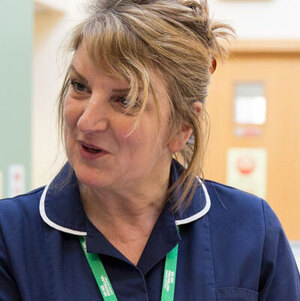
Macmillan nurses
What is a Macmillan nurse?
Macmillan nurses are specialist nurses that work in different areas of cancer care and treatment. They work in hospitals, hospices and in the community.
Macmillan nurses can help you understand your cancer diagnosis and treatment. They can offer support to you, and the people close to you.
Macmillan nurses are registered nurses with skills and experience in caring for people with cancer. They often have further qualifications in cancer care.
To get a Macmillan nurse, you need to be referred to one by your doctor or nurse. If there isn't a Macmillan nurse in your area, you can still be referred to other specialist services. We have more information about referrals in the Frequently Asked Questions section below.
What does a Macmillan nurse do?
Macmillan nurses can help you with your cancer diagnosis, treatment, and help manage side effects. They offer information, emotional and practical support. They can also tell you about other support available. This may include information about social care, benefits advice, and local support groups.
You can find out about the types of Macmillan nurses below.
Macmillan Clinical Nurse Specialist (CNS)
'When I was in hospital, I didn't have to worry about the cancer - my CNS and the team ensured everything went so smoothly that I only had to focus on the next step of the treatment and recovery process.' - Martha, diagnosed with cervical cancer
Some Macmillan nurses are based at the hospital and work as part of a multidisciplinary team (MDT). A clinical nurse specialist (CNS) gives information about cancer, and support during treatment.
A CNS who specialises in the type of cancer you have is usually your main contact at the hospital. They are called your key worker.
They will give you information about:
- the type of cancer you have
- your treatment options
- possible side effects.
They usually co-ordinate your care. They can also give you and your family practical and emotional support and refer you to other services that can help.
You are usually referred to a CNS when you are first going for tests for cancer, or have just been diagnosed with cancer. They will give you a telephone number so you can contact them. But there may not always be a CNS for your type of cancer. You can ask your doctor if there is a nurse specialist you can talk to.
The CNS may be part of a team of clinical nurse specialists. This depends on:
- the type of cancer they specialise in
- how many people they care for.
You may have more than one CNS involved in your care.
A Macmillan CNS may specialise in an area that is not specific to a type of cancer. They may specialise in:
- a cancer treatment such as chemotherapy
- caring for urgent problems caused by cancer or its treatments
- a particular symptom of cancer or side effect of cancer treatment such as lymphoedema.
You may see these nurses as well as your key worker.
Palliative care nurses
Often, people will say “Macmillan nurse” to mean a nurse who helps manage the symptoms of advanced cancer. Nurses that do this are called specialist palliative care nurses.
Some palliative care nurses are based in hospital. They may be called a palliative care clinical nurse specialist (CNS). They see you if you are in the hospital as an inpatient. They are experts in managing your symptoms and medications. They will work with your key worker and other members of the multidisciplinary team (MDT) to help plan your care in hospital. They may refer you to the palliative care team in the community when you go home.
Other specialist palliative care nurses are based in the community and visit you in your home. They work as part of a community palliative care team and may be connected to a hospice. They may have a different name, which might include the hospice they are attached to.
Community palliative care nurses work with your GP and district nursing care team to give specialist advice on:
- treating symptoms
- medicines
- emotional support
- other support you may need.
All specialist palliative care nurses, even if they are based in different places or are known by different names, have similar skills and knowledge. Their aim is to help you live as well as possible.
They are experts in controlling symptoms such as pain or shortness of breath. They can:
- help manage your medications
- help you plan for your future
- arrange practical care and support if you need it
- offer emotional support to you and the people close to you.
They do not usually give hands-on physical nursing care in the same way as hospital ward nurses or district nurses in the community.
In the video below, Andy talks about his experience of being a Macmillan Palliative Care Clinical Nurse Specialist. We have more information about palliative care and cancer.
Frequently asked questions
-
How do I get a Macmillan nurse?
Macmillan cancer nurse specialist
Your doctor or nurse will refer you to a Macmillan cancer nurse specialist if there is one available. This may happen when you are first going for tests for cancer or have just been diagnosed with cancer. Our Support Line teams cannot refer you to a Macmillan nurse in the hospital or your community, but we do have registered nurses on our Support Line who can give you information and support over the phone, by webchat or email.
Macmillan palliative care nurse
Your GP, cancer doctor or nurse or district nurse can refer you for palliative care or to get a Macmillan palliative care nurse. This will depend on your situation and needs. They can only refer you if you agree. If you would like to be referred but no-one has talked to you about it, talk to your cancer team or GP.
There are many other types of nurses who help look after people with cancer at home. These include district nurses, hospice at home nurses and Marie Curie nurses.
-
When can I be referred to a Macmillan palliative care nurse?
Some people think Macmillan nurses only help people at the end of life. But when you have advanced cancer, you can be referred to a palliative care nurse at any time. Palliative means that is it not possible to cure the cancer. But many people can live for a long time with advanced cancer. Palliative treatment aims to manage the cancer and any symptoms so you can live as well as possible during that time.
You may be referred to manage symptoms and then be discharged when you no longer need that care and support. You can always be referred again if needed.
Some people may be referred when they are first diagnosed with advanced cancer. Then they are known to the community palliative care team and can access their support when they need it.
-
Can I get a Macmillan nurse by calling the Macmillan Support Line?
Macmillan support line teams are not able to make referrals to Macmillan nurses, but they can talk through any questions you may have about cancer, treatment or other issues that may be affecting you. They can help you understand your options.
Your own doctor or nurse can refer you to a Macmillan nurse. This could be your hospital doctor, your GP, your clinical nurse specialist or your district nurse. Macmillan nurses are specialist nurses that work in different areas of cancer care and treatment. They work in hospitals, hospices and in the community. If there isn't a Macmillan nurse in your area, your doctor or nurse may refer you to other specialist services.
If you would like to talk about your care or give feedback about a Macmillan nurse, you should contact the hospital, hospice or your GP practice.
-
How are Macmillan nurses funded?
Macmillan Cancer Support will usually fund a Macmillan post for 3 years. After this time, the NHS or other organisations will continue the funding. A Macmillan nurse will usually keep their Macmillan job title, even if they are funded by the NHS.
About our information
-
References
Below is a sample of the sources used in our cancer pain information. If you would like more information about the sources we use, please contact us at informationproductionteam@macmillan.org.uk
Nurses working in cancer care | Macmillan Cancer Support (accessed June 2024)
Being cared for at home | Macmillan Cancer Support (accessed June 2024)
-
Reviewers
This information has been written, revised and edited by Macmillan Cancer Support’s Cancer Information Development team. It has been reviewed by expert medical and health professionals and people living with cancer. It has been approved by Chief Medical Editor, Professor Tim Iveson, Consultant Medical Oncologist.
Our cancer information has been awarded the PIF TICK. Created by the Patient Information Forum, this quality mark shows we meet PIF’s 10 criteria for trustworthy health information.




